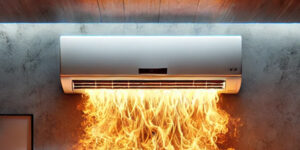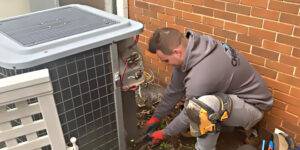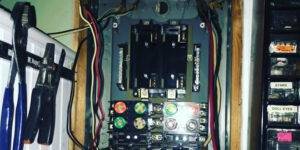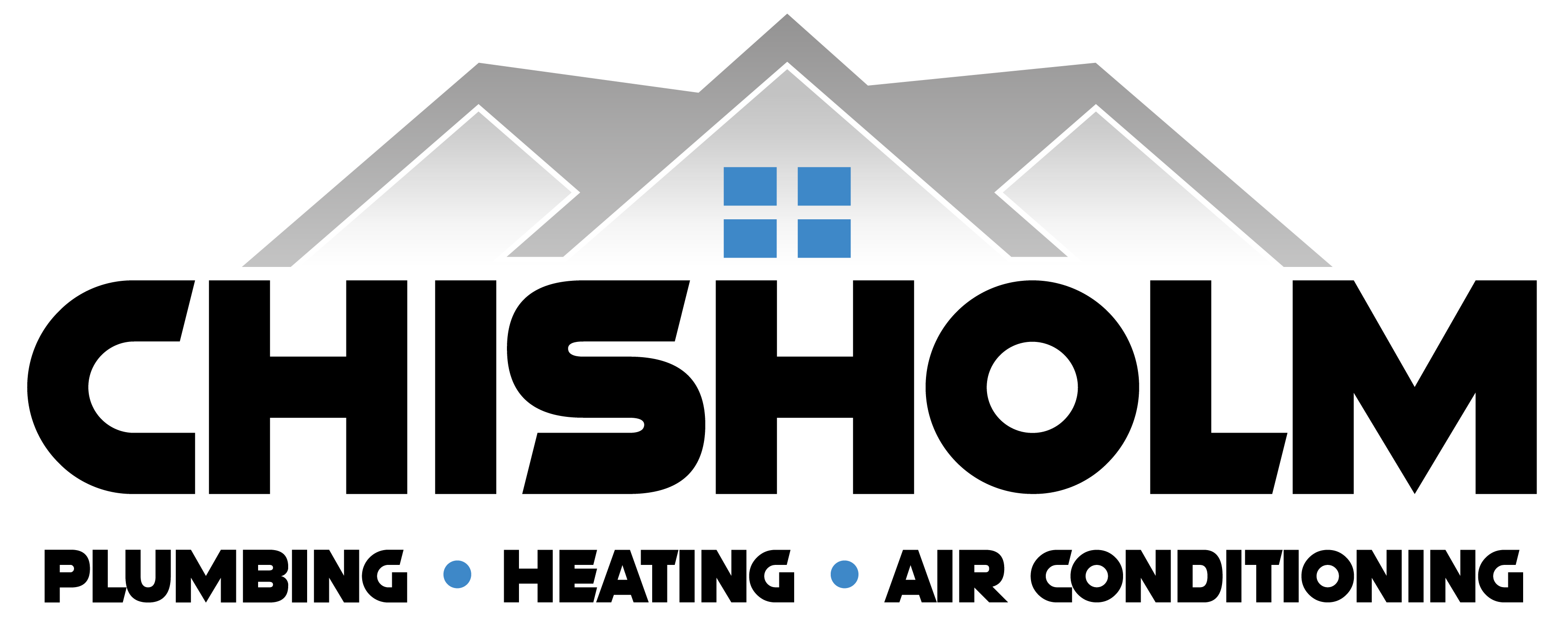
In the sweltering summers of Greer, SC, a well-functioning air conditioning system is essential for staying comfortable and cool. However, it’s frustrating when your AC starts blowing warm air instead of the refreshing breeze you expect. Several factors can cause this issue, and identifying the right one can be challenging without proper guidance. In this blog post, we’ll explore common reasons why your AC might be blowing warm air and provide practical troubleshooting tips to help you restore comfort to your home.
If you’re experiencing persistent issues with your air conditioning system, our team at Chisholm Plumbing Heating & Air Conditioning is here to help. We offer comprehensive AC repair services in Greer to get your system back up and running efficiently.
Check Your Thermostat Settings
The first step in troubleshooting your AC is to check the thermostat settings. It may seem simple, but incorrect settings are a common cause of AC units blowing warm air. Make sure your thermostat is set to “cool” mode, and the temperature is set lower than the current room temperature.
Sometimes, the thermostat can be accidentally set to “heat” or “fan” mode, which may cause the AC to blow warm air. Additionally, if your thermostat is programmable, ensure that the scheduled settings are correct and haven’t changed unexpectedly.
If your thermostat settings seem correct but you’re still experiencing issues, it might be a sign of a faulty thermostat that needs repair or replacement. In such cases, consulting a professional can help diagnose and fix the problem.
For professional assistance with thermostat issues, contact Chisholm Plumbing Heating & Air Conditioning. We can help ensure your AC system is functioning optimally.

Inspect Air Filters
Dirty or clogged air filters are a common reason for an AC system to blow warm air. Over time, air filters can accumulate dust, dirt, and debris, restricting airflow and reducing the cooling efficiency of your unit. When airflow is blocked, the air circulating through your AC system may not be sufficiently cooled, leading to warm air blowing into your home.
To ensure optimal performance, it’s essential to check and replace your air filters regularly. Most manufacturers recommend changing air filters every 1 to 3 months, depending on usage and air quality. If you have pets or live in an area with high pollen or dust levels, you may need to replace your filters more frequently.
Here’s how you can inspect your air filters:
- Turn off the AC unit: Always turn off the power to your AC unit before inspecting or replacing the filters.
- Locate the air filter: Check your AC unit’s manual to find the filter’s location, typically found near the return air duct or inside the air handler.
- Inspect the filter: Remove the filter and hold it up to a light source. If you can’t see the light through the filter, it’s time to replace it.
- Replace with a new filter: Ensure the new filter is the correct size and type for your unit, then install it in the same direction as the old one.
Regular maintenance of air filters not only helps prevent your AC from blowing warm air but also improves indoor air quality and extends the life of your system. For more guidance on AC maintenance, check out our AC maintenance services in Greer.
Examine the Outdoor Unit
Your AC system’s outdoor unit plays a crucial role in cooling your home. If it becomes dirty or obstructed, it can lead to your AC blowing warm air. The outdoor unit, also known as the condenser unit, is responsible for releasing the heat absorbed from inside your home. When dirt, leaves, or other debris accumulate around the unit, it can hinder this heat exchange process, resulting in reduced cooling efficiency.
Here are some steps to ensure your outdoor unit is in good condition:
- Turn off the power: Before inspecting or cleaning the outdoor unit, always turn off the power to the AC system for safety.
- Clear debris: Remove leaves, grass clippings, and any other debris around the unit to ensure proper airflow.
- Clean the fins: Use a gentle brush or vacuum to clean the condenser fins. Be careful not to bend or damage them.
- Check for obstructions: Make sure there’s at least two feet of clearance around the unit to allow for adequate airflow.
Keeping the outdoor unit clean can significantly enhance your AC’s performance and prevent it from blowing warm air. Regular maintenance not only ensures efficient cooling but also extends the lifespan of your system.
If you’re unsure about inspecting or cleaning the outdoor unit yourself, our team at Chisholm Plumbing Heating & Air Conditioning is here to help. Learn more about our AC installation and replacement services in Greer if you’re considering upgrading to a more efficient system.

Refrigerant Levels
Refrigerant is a crucial component in your AC system, responsible for absorbing and releasing heat to cool your home. If your AC is blowing warm air, low refrigerant levels might be the cause. This can occur due to leaks in the system or insufficient refrigerant charge during installation.
Signs of low refrigerant levels include:
- AC blowing warm or hot air
- Ice buildup on the refrigerant line or evaporator coil
- Hissing or bubbling noises from the AC unit
- Higher than usual energy bills
It’s important to note that refrigerant levels should never decrease under normal circumstances. If your system is low on refrigerant, it likely indicates a leak that needs professional attention. Attempting to add refrigerant yourself is not recommended, as it requires specialized tools and knowledge.
If you suspect a refrigerant issue, it’s best to contact a qualified HVAC technician. Our team at Chisholm Plumbing Heating & Air Conditioning can diagnose refrigerant leaks and perform necessary repairs to restore your AC’s cooling efficiency. You can learn more about our AC repair services in Greer and how we can help you get your system back in top shape.
Electrical Issues
Electrical issues can be another common reason your AC is blowing warm air. Problems such as tripped breakers, blown fuses, or faulty wiring can interrupt the power supply to your AC system, affecting its ability to cool your home effectively.
Here are some common electrical issues to check:
- Tripped Breakers: Check your home’s electrical panel for tripped breakers. Resetting a tripped breaker can sometimes restore power to your AC unit.
- Blown Fuses: If your AC system has a fuse box, check for blown fuses and replace them if necessary.
- Faulty Wiring: Loose or damaged wiring within the AC system can disrupt power and lead to warm air blowing. This issue requires professional inspection and repair.
- Capacitor Problems: The capacitor is a component that helps start the AC’s motors. If it fails, your system might not operate correctly.
While some electrical issues might be simple to fix, others require the expertise of a professional. Handling electrical components without the proper knowledge can be dangerous and may void warranties or cause further damage.
If you suspect electrical issues with your AC, it’s best to consult a qualified technician. Our team at Chisholm Plumbing Heating & Air Conditioning is ready to help you resolve any electrical problems and ensure your system is running smoothly. Reach out to us via our contact page for expert assistance.

Ductwork Problems
Issues with your home’s ductwork can also cause your AC to blow warm air. The ductwork is responsible for distributing cooled air throughout your home, and any problems can significantly impact your AC’s performance. Here are some common ductwork issues to be aware of:
- Leaks: Holes or cracks in the ductwork can lead to cooled air escaping before it reaches your living spaces, causing uneven cooling and warm air blowing from the vents.
- Poor Insulation: Inadequately insulated ducts can lose cool air as it travels through unconditioned spaces, such as attics or basements, resulting in reduced cooling efficiency.
- Obstructions: Debris or dust buildup in the ducts can block airflow, leading to reduced cooling and increased energy consumption.
- Incorrectly Sized Ducts: Ducts that are too small or too large for your system can affect airflow and cooling efficiency.
Regular inspection and maintenance of your ductwork can help prevent these issues and ensure your AC system operates effectively. If you notice inconsistent temperatures or suspect duct problems, it may be time to have a professional inspect your system.
Our team at Chisholm Plumbing Heating & Air Conditioning can provide expert ductwork inspections and solutions to ensure your AC system delivers optimal performance. For more information about our service area, visit our service area page.
Conclusion
Keeping your AC system in top shape is essential for staying comfortable during the hot summers in Greer, SC. If your AC is blowing warm air, there are several potential causes, from simple thermostat issues to more complex problems with refrigerant levels or ductwork. By following the troubleshooting tips outlined in this guide, you can identify and resolve many common issues that might be affecting your AC’s performance.
Regular maintenance is key to preventing these problems and ensuring your AC operates efficiently. Whether it’s cleaning air filters, inspecting the outdoor unit, or addressing electrical and ductwork concerns, proactive care can extend the life of your system and save you money on energy bills.
For persistent issues or professional assistance, the experienced team at Chisholm Plumbing Heating & Air Conditioning is here to help. We offer comprehensive AC repair, installation, and maintenance services in Greer, SC. Don’t hesitate to contact us for all your HVAC needs. Our team is dedicated to providing you with reliable solutions to keep your home cool and comfortable.
